Maneuvers and Retroperitoneal Exposure
Maneuvers and Retroperitoneal Exposure
David Ray Velez, MD
Table of Contents
Approach to Retroperitoneal Exposure
There is Significant Overlap with Maneuvers and They Should be Tailored to the Individual Patient to Keep Retroperitoneal Exploration Targeted and Limited
Exposure of the Inferior Vena Cava (IVC)
- Suprarenal IVC: Kocher Maneuver
- Infrarenal IVC: Right-Medial Visceral Rotation
- Distal IVC and Iliac Bifurcation May Require Transection of Right Iliac Artery to Access
Exposure of the Aorta
- Suprarenal Aorta: Left-Medial Visceral Rotation
- Infrarenal Aorta: Transperitoneal Inframesocolic Exposure
Exposure of Arterial Branches
- Celiac Axis: Left-Medial Visceral Rotation
- Superior Mesenteric Artery (SMA):
- Proximal SMA: Left-Medial Visceral Rotation
- Body/Distal SMA: Transperitoneal Inframesocolic Exposure
- Inferior Mesenteric Artery (IMA): Transperitoneal Inframesocolic Exposure
Exposure of the Duodenum
- Proximal (D1, D2, and Proximal D3): Kocher Maneuver
- Distal (Distal D3 and D4): Right-Medial Visceral Rotation
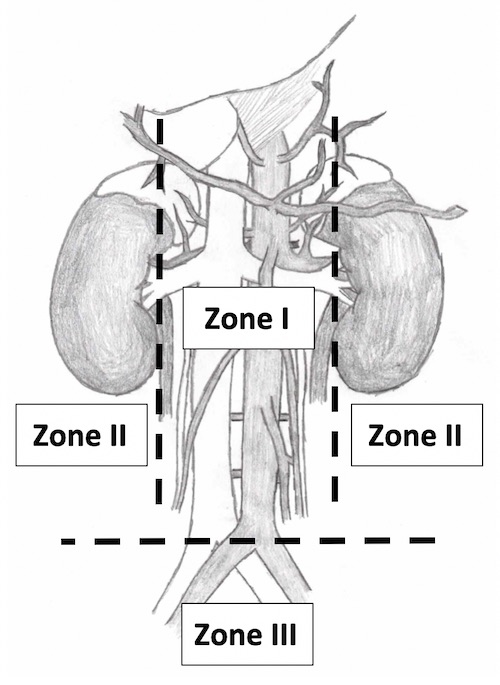
Retroperitoneal Zones
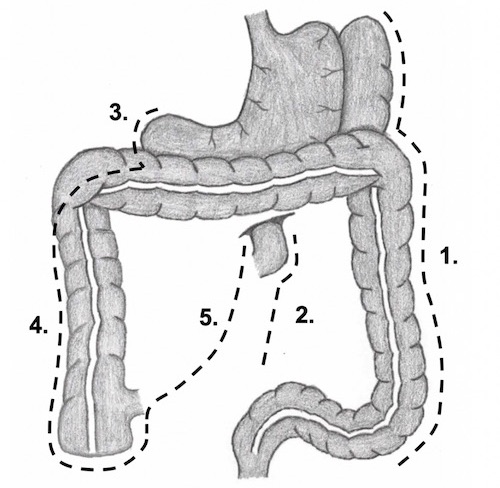
Maneuvers to Access the Retroperitoneum: 1. Mattox, 2. Transperitoneal Inframesocolic Exposure, 3. Kocher*, 4. “Extended” Kocher*, 5. “Super-Extended” Kocher*, *#3-5 Together Compose the Cattell-Braasch Maneuver
Kocher Maneuver
Mobilization of the Duodenum
Procedure
- Incise the Posterolateral Peritoneal Attachments of the Duodenum
- Place Hand Behind the Duodenum/Pancreatic Head and Retract Medially
- Duodenum (Along with the Superior Mesenteric Vessels) is Mobilized Off the IVC and Aorta
Visualization
- Duodenum (D1, D2, Proximal D3) – Distal D3 and D4 are Not Visualized
- Head of the Pancreas
- Suprarenal IVC
- Right Renal Hilum
Notable Pitfalls: Right Gonadal Vein Injury
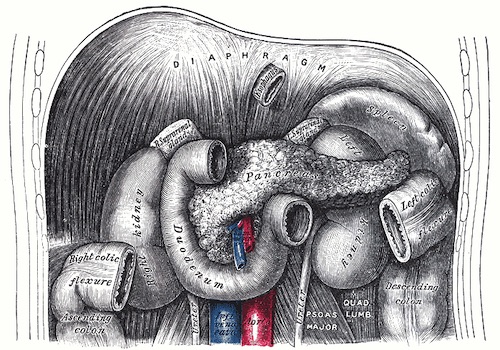
Duodenum
Right-Sided Medial Visceral Rotation (Cattel-Braasch Maneuver)
Mobilization of the Right Colon
Procedure: 3-Stages
- Stage 1. Kocher Maneuver – *See Above
- Stage 2. “Extended” Kocher Maneuver
- Extend the Incision Caudally Along the Hepatic Flexure and Right White Line of Toldt
- Fully Mobilize the Ascending Colon
- Stage 3. “Super-Extended” Kocher Maneuver
- Extend the Incision Around the Cecum
- Retract Bowel to the Right and Superiorly
- Incise the Mesenteric Attachment to the Posterior Peritoneum from the Medial Cecum to the Ligament of Treitz
- Some Prefer to Perform the Kocher Maneuver After Right Colon Mobilization
Visualization
- Panoramic View of Entire Inframesocolic Retroperitoneum
- Infrahepatic Inferior Vena Cava (IVC) – Not the Retrohepatic IVC
- Inframesocolic Aorta
- Duodenum – Entire Duodenum Including D3 and D4
- Head of the Pancreas
- Right Kidney and Ureter
- Ascending Colon
Only Two Areas of the Retroperitoneum are Inaccessible: Retrohepatic IVC and Supramesocolic Aorta
Notable Pitfalls: Superior Mesenteric Vein (SMV) Injury – Right Colon Hangs by the Mesentery Alone and an Inadvertent Pull Will Avulse the Right Colic Vein off the SMV
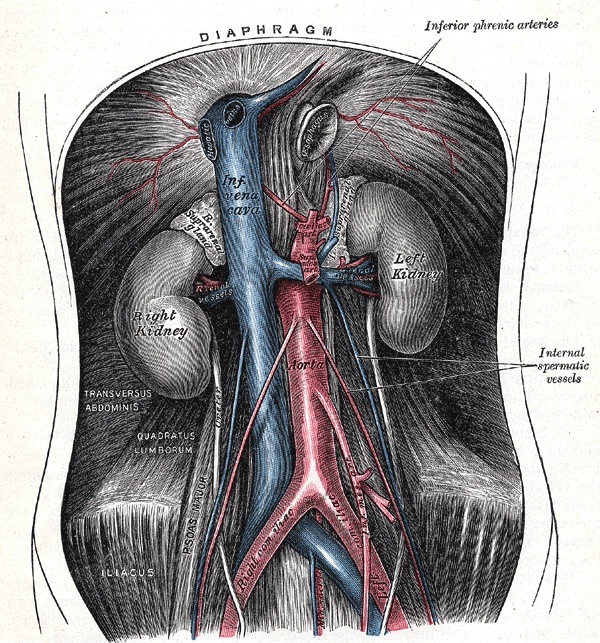
Retroperitoneum
Left-Sided Medial Visceral Rotation (Mattox Maneuver)
Mobilization of the Left Colon
Procedure
- Incision Along the Left White Line of Toldt to Mobilize the Descending Colon
- Extend Incision Lateral Around the Spleen
- Using Hand Sweep from Below-Up and Medial
- Dissection Plane is Directly on the Posterior Abdominal Wall
- Rotate All Structures to the Midline
Modified Mattox Maneuver: The Left Kidney is Left Behind and is Not Mobilized During the Maneuver
Visualization
- Entire Abdominal Aorta
- Proximal Celiac Axis
- Proximal Superior Mesenteric Artery (SMA)
- Proximal Inferior Mesenteric Artery (IMA)
- Left Renal Artery/Vein
- Left Kidney and Ureter
- Descending Colon
- Minimal IVC Exposure
Notable Pitfalls: Splenic Injury or Avulsion of Left Descending Lumbar Vein Off the Renal Vein
Transperitoneal Inframesocolic Exposure
*There are No Well-Established Names for the Maneuver
Incision Directly Over the Aorta Below the Transverse Mesocolon
Used in Vascular Surgery as the Preferred Operative Approach for a Transperitoneal Open AAA Repair
Procedure
- Reflect the Transverse Colon Cephalad
- Eviscerate the Small Bowel to the Right
- Incise the Retroperitoneum Along Midline
- Start Incision at the Ligament of Treitz to the Left of the Aorta
- Extend the Incision Caudally to the Right of the Aorta – Avoid IMA/IMV Injury
Visualization
- Inframesocolic Aorta
More Targeted/Limited Than a Mattox Maneuver if Supramesocolic Access is Unnecessary
Notable Pitfalls: Inferior Mesenteric Vein (IMV) Injury with the Initial Incision
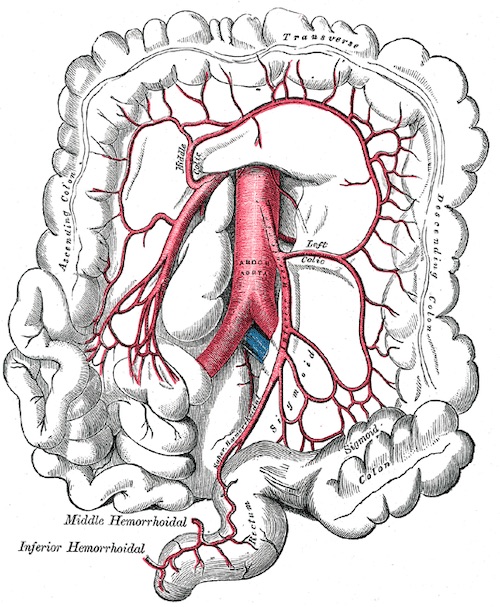
Inframesocolic Aorta